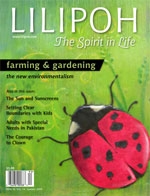The Passion to Farm
 By Anne Morgan
By Anne Morgan
Summer 2009; Farming & Gardening - Issue 56, Vol. 14
One woman’s story of why she works so hard
I married into agriculture. Still processing his near-death experience in Vietnam, Dewane could only say, “I need to farm organically.” I was young, in love, and uncertain of my personal destiny in life. “Sure,” I replied. “Let’s go for it.”
My family was appalled. They knew I liked to cook, but this was not the life they raised me for. The pay was sure to be low, the work hard. Horticulture is not an esteemed profession. We outsource much of our food production. We all want cheap food.
But do we? Produce raised thousands of miles away has to be picked unripe; its nutrient profile is undeveloped. You can taste the truth of this statement. Just compare a winter tomato to a summer one. Standards in other countries can be lax. A friend who served in the Peace Corps in Central America in the 1990s related how small farmers applied agricultural chemicals: double doses meant better results. Tainted pet food and baby formula—we can condemn foreigners, but we have been presented with contaminated peanut butter produced right here in the USA. The pressure for cheap exposes us to risk.
I learned to garden because I wanted to feed my children wholesome food. I recognized the correlation between highly processed foods and diabetes, pesticides and cancers, nutrition and health. I prized the vitamins, minerals and fiber in a freshly harvested salad of baby greens. I wanted them to eat the skins of potatoes. I taught them to pop open a pea pod and pick out fresh green peas; to find perfectly ripe raspberries; how to dig up a carrot, wipe it on their jeans, and take a big bite without fear of soil (versus dirt).
I learned to garden biodynamically though the conviction that I am a temporary steward who will someday have to answer for how I cared for the earth. When I take a worn-out piece of ground and restore it to productivity, diversity, health and beauty, I am redeeming something of God’s that has been spoiled. Industrial agriculture focuses more on squeezing cash profits out of the soil without regard for His creations, be they old-growth forests or soil microbes. I know in my heart that in the way I serve the least of things is also how I serve Him.
I garden because I prefer to couple exercise with external accomplishment. By the time the tomatoes are composted and mulched, I am back in shape.
I garden for a hundred families because Community Supported Agriculture is about relationships. It is about interconnectedness. CSA members are my support and my community. In turn, I strive to be a source of love, care and truth in a world that is against those things by sharing my life, my farm, and my passion for this work.
I sell shares in the CSA because this is the most just way I have found to exchange food for money. Members’ food dollars go directly to the garden’s workers, rather than to a lengthy and obscure chain of supply that often has underpaid and abused agricultural workers on the other end. Share prices are calculated on what it costs to grow the garden. Not more, not less. Everything raised is divided equally between share members. I listen to members and, to the best of my ability, plant in proportions that reflect their preferences. I do everything I can to bring in abundant crops, and I agonize (still, after all these years) when a crop falls short due to weather conditions beyond my control. CSAs are the embodiment of transparency and trust.
I believe in the value of CSA. The best way to maximize your food budget is to cook basic products at home. In season, local produce is the best bang for your buck. Families can share more than physical nourishment in the kitchen. It is an opportunity to teach and to listen, to hug and be hugged. Don’t have family nearby? Invite a neighbor. Make a new friend.
I keep gardening with an open offer to share what I know, especially with the next generation. I pray they will stand on my shoulders, not repeat my mistakes.
I garden because I cannot thrive without the blessings of working in—and with—Nature. I hated the years I spent on the road attending Fancy Food Shows. My income was higher, but my spirit suffered. And in the end, spirit is what I will leave with.
Anne, along with her husband Dewane, operates Midheaven Farm in Minnesota. The 460 acre farm is Demeter-Certified Biodynamic, and produces beef cattle, hay, oats and corn, and a full spectrum of vegetables for their CSA. Somehow, after all the long hours in the field, they still find time to serve the larger community and educate their customers. Dewane sits on the board of the Josephine Porter Institute for Applied Biodynamics, and Anne writes a weekly newsletter for her customers.
